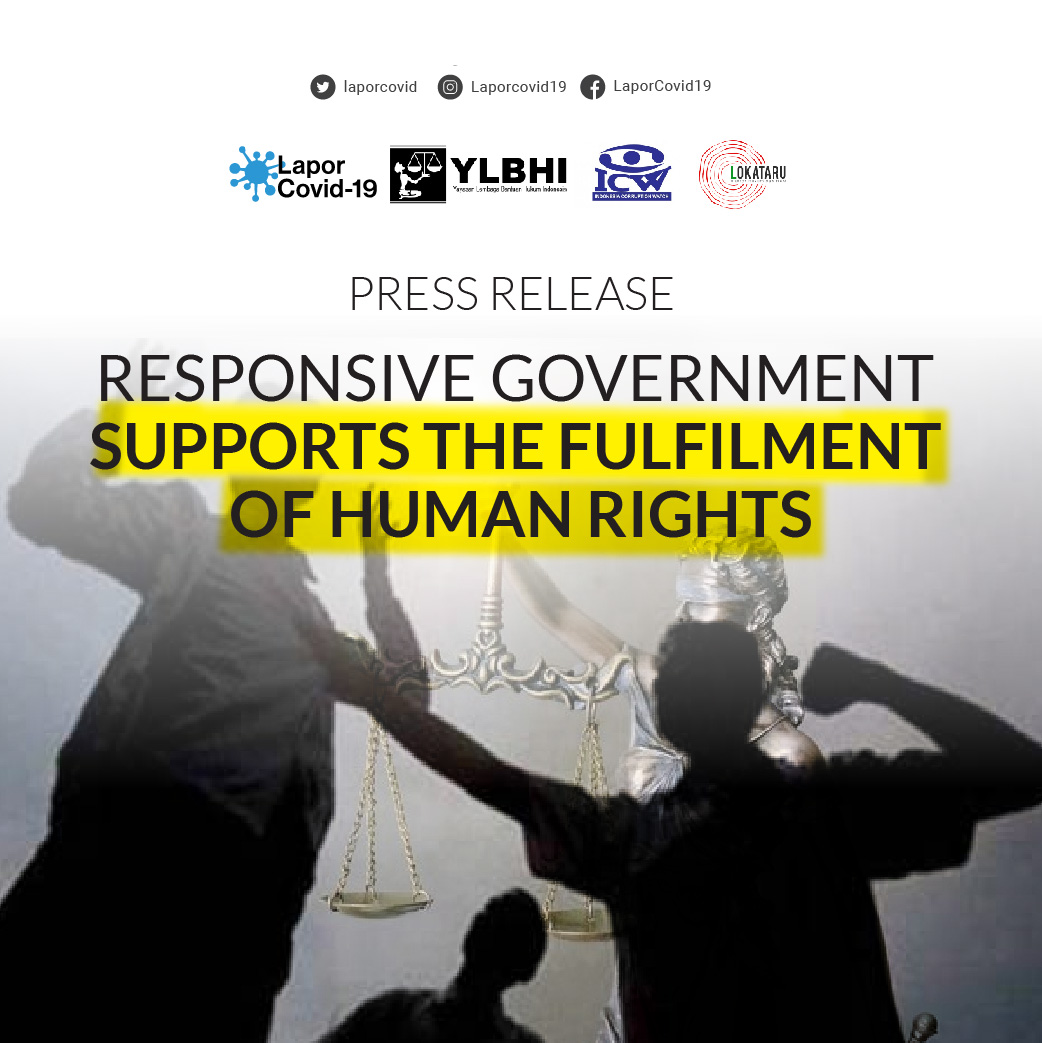PRESS RELEASE
Civil Society Coalition For Health Justice
In commemoration of Human Rights Day, 10th December
Responsive Government Supports the Fulfilment of Human Rights
8th December 2021. The Covid-19 pandemic can potentially worsen the situation of fulfilling Human Rights in Indonesia, particularly the fulfilment of fundamental rights related to the pandemic and the protection of people whose rights have been violated. The incapability can see this of the state to provide efficient, effective, and accountable public services for the whole of society, especially the poor and less fortunate.
During the pandemic, the Coalition has noted the weak role of the government in achieving good, responsive, open, and accountable public services and encouraging, facilitating and protecting public participation. Meanwhile, good public services are one of the conditions for fulfilling human rights, especially access to health services during the pandemic.
Complaints without Response
Public participation through providing input and complaints, as well as complaints about public services and follow-up from the government still faces challenges. This is the case even though this is already managed in the Constitutional Act Number 25 the Year 2009 about Public Services Article 18 verse (c) that citizens have the right to get a response to complaints that are submitted.
Based on the data from the Coalition, the handling of public services in several related ministries/institutions is still less than optimal. During the last year, LaporCovid-19 received many complaints from citizens, such as difficulty accessing an rt-PCR test, access to vaccinations and medication, violation of the health protocol in public places and shopping face-to-face, and difficulty receiving social support.
Unfortunately, many government complaint channels are not appropriately managed, so fulfilling the citizen’s right to get accurate information and good public services does not function optimally. In addition, there is still a lack of involvement and commitment from service leaders in terms of determining budget sources and training appropriate service staff.
Those Who Have a Voice are Threatened
In 2021, we noted at least nine public complaints, which resulted in a counterattack and threat. For example, intimidation and bullying were faced by the public after reporting a violation of provisions for face-to-face learning during the enforcement of restrictions on community activities (PPKM) in the Bandung Regency. LaporCovid-19, together with the Bandung Legal Aid Institute, already asked the local Education Office to mediate and stop the intimidation and bullying. However, this mediation has not been carried out and responses or follow-ups on reports of bullying in the school environment were also not given.
Rewind to May 2021, where complaints about health worker incentives which had not yet been given have also resulted in intimidation and repressive actions. Volunteer health workers in Wisma Atlet have recorded that the number of volunteer health workers who have not received incentives planned to speak out via a press conference but had failed to do so due to pressure from various parties. It even ended up with the volunteer assignment contract not being extended.
Then the residents who reported the alleged misappropriation of social assistance by individuals in the Neighbourhood Association in Kebon Jeruk, Jakarta, threatened their right to social protection would be removed. This happened even though social protection is very much needed by residents affected by the Covid-19 Pandemic.
In another way, the LaporCovid-19 volunteer team also received intimidation from stakeholders. This occurred when reports from citizens were forwarded, and relevant stakeholders were encouraged to respond and resolve the complaints. This included pushing for transparency of death data due to Covid-19. The intimidation received included verbal threats via telephone, during closed meetings, and doxing of volunteer population personal data. In early 2021, publications about the death of a patient during transportation as a result of being rejected by several hospitals in the Depok area, West Java, received intimidation from local stakeholders.
Irma Hidayana, from LaporCovid-19, said that reports from citizens are considered to be obstacles to agency performance, criticism which is not constructive and often viewed as defaming the relevant agency. However, the report is helpful for improving the bureaucracy of an agency and the policies that have been launched.
The Presidential Chief of Staff, Moeldoko, also sent a subpoena to Indonesian Corruption Watch (ICW) regarding the finding of an alleged conflict of interest through his close relationship with PT Harsen Laboratories, the manufacturer of Ivermectin which is claimed to be a Covid-19 medicine. In fact, this was an effort to monitor the transparency of pandemic control so that it truly stands for the health and safety of the people.
“These threats show that the state is not able to protect and provide a safe space for citizens who are pushing for improvements in the public service sector,” explained Muhammad Isnur, representative of the Coalition from the Indonesian Legal Aid Foundation.
The incidents above show that the government is not serious in responding to citizens’ complaints and protecting their right to accountable public services following the mandate of the Constitutional Act 25/2009. In fact, the state has an obligation to fulfill human rights (duty bearer), which means that the state is obliged to respect, protect and fulfil the human rights of every citizen, which is manifested by, among other things, responsive actions to the voices of its citizens, including criticism and encouraging transparency and accountability.
Following the mandate of the UN Human Rights Council report 25/27 2013, public services based on openness, accountability, and response to public complaints, are one essential component of human rights. So in commemoration of International Human Rights Day, the Coalition recommends that the government:
- Provide general services which are efficient, effective, and accountable for the whole of society, especially for the poor and less fortunate during the Covid-19 pandemic;
- Listen to the voice of the people. Among other things, this is realized by responding to and following up on complaints, input, and complaints from residents regarding the handling and violations of Covid-19 in Indonesia;
- Stop forms of intimidation and threats toward the public who have a voice to improve public services during the pandemic;
- Protect citizens who submit public complaints so that residents do not feel afraid of the consequences of their reports


